Kia unveils low-cost EV models to reboot sales growth
The Kia EV5 will be equipped with LFP and NCF batteries made in China to cut prices
By Oct 12, 2023 (Gmt+09:00)
LG Chem to sell water filter business to Glenwood PE for $692 million


Kyobo Life poised to buy Japan’s SBI Group-owned savings bank


KT&G eyes overseas M&A after rejecting activist fund's offer


StockX in merger talks with Naver’s online reseller Kream


Mirae Asset to be named Korea Post’s core real estate fund operator


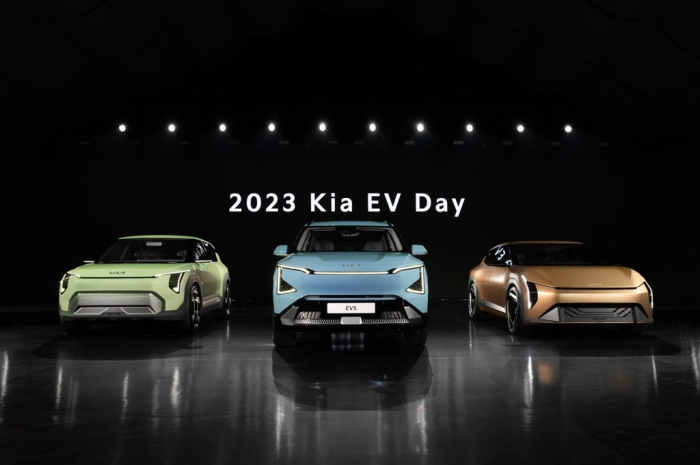
Kia Corp., South Korea’s No. 2 automaker, showcased new low-cost electric vehicles on Thursday to boost the slowing growth in clean automobiles by offering cheaper eco-friendly models to budget-conscious drivers.
Kia, an affiliate of the country’s top carmaker Hyundai Motor Co., unveiled concept models of the EV4 electric sedan and the EV3 compact electric sport utility vehicle while introducing the EV5, its first China-made all-electric SUV.
Kia is set to launch them at price tags ranging from $35,000 to $50,000 by stages from next year. Customers are likely to spend less than those prices to buy them, given government subsidiaries. The company also plans to introduce the EV1 and EV2, entry-level models that are set to be sold at around $30,000.
“The EV market has passed the early adopter stage but has yet to reach the popularization point,” said Kia President and CEO Song Ho Sung at its EV Day event. “We aim to accelerate the transition to the era of electric mobility by solving problems of high prices and inconvenient charging, which hinder the spread of EVs.”
Global carmakers rushed to release cheaper EVs with the entry price in the $25,000-$30,000 range with hopes that such models would boost their sales despite smaller government subsidies, higher borrowing costs and insufficient charging stations.
PRICES
Kia has sold only about 4,200 EV9s, its flagship large all-electric SUV, since it launched in June, less than the sales volume of the company’s popular model for a month.
High prices, along with some quality issues, were blamed for the sluggish sales. The most expensive model with all options costs about 100 million won ($74,710) in South Korea, although the price comes down to around 70 million won with the country’s subsidies for EVs. That is almost double the price of the entry-level Palisade, Hyundai’s mid-sized SUV, and the Carnival, Kia’s minivan.
That caused the company to develop low-cost models to boost its EV sales.
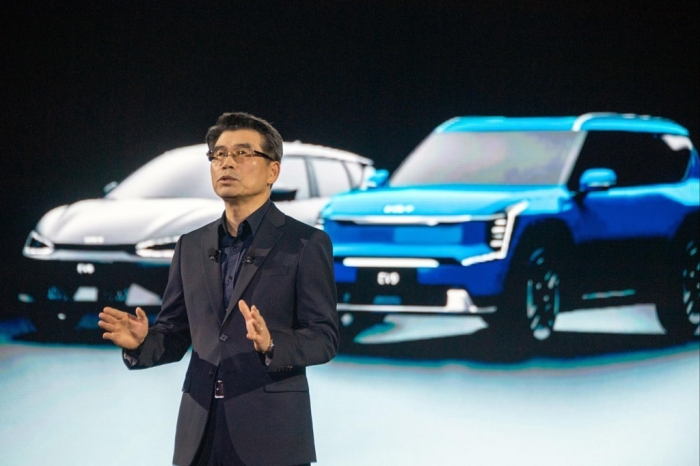
“Starting with the launches of small and medium-sized EV3, 4 and 5, we will provide various lineups including cheaper entry models to lead the EV popularization,” Song said.
The company, which currently sells the EV9 and the EV6 electric crossover utility vehicle, plans to release 15 EVs priced from $30,000 to $80,000 by 2027.
TWO VERSIONS OF EV5
Kia plans to manufacture two versions of the EV5 – one made in China for the world’s largest EV market to be launched later this year and the other made in South Korea to be released in 2025 for other countries.
The EV5 will be built on E-GMP, a dedicated EV platform of Hyundai Motor Group, the world’s third-largest automaker.
The electric compact SUV improves economics with a smaller body while providing convenience features and new technology such as the front bench seat and vehicle-to-load (V2L), which allows users to use the large battery in the vehicle to power or charge something else.
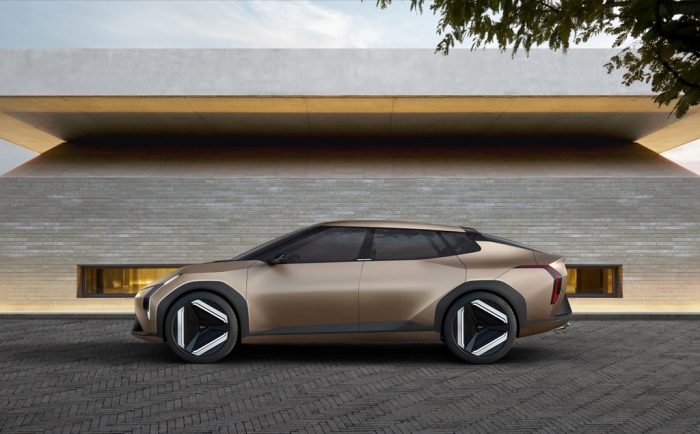
Kia aims to release the EV3 and the EV4 by stages from early next year. The company is set to use its own generative artificial intelligence for the EV3 and expand the technology to other models including the EV4 and the EV5.
CHEAPER CHINESE BATTERIES, CONVENIENT CHARGING
Kia plans to use batteries made in China to cut prices. The EV5 manufactured in the mainland and South Korea will be equipped with lithium iron phosphate (LFP) batteries and nickel-cobalt-manganese (NCM) batteries, respectively.But both battery models are known to be produced in China, according to industry sources in Seoul.
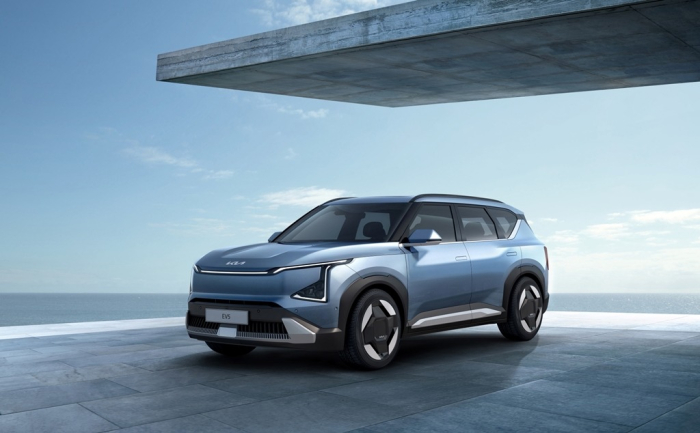
“It will have a better price competitiveness to use Chinese batteries, even considering the logistics costs of importing batteries from the country,” said one of the sources.
The company also plans to increase charging stations. Hyundai and Kia have been already expanding cooperations with global automakers to expand charging infrastructure.
They are scheduled to install 30,000 fast-charging stations in cooperation with six automakers such as General Motors Co. and Stellantis N.V. in North America, the world’s No. 2 EV market. In Europe, the third-largest market, Hyundai Motor Group is set to establish 7,000 charging points by 2025 through Ionity, an alliance with Volkswagen Group, BMW AG, Mercedes-Benz Group and Ford Motor Co. Hyundai and Kia have joined Tesla Inc.'s Supercharger EV network in the US.
In South Korea, they plan to set up 3,500 charging stations by 2025 including the E-pit they operate while expanding the infrastructure in collaboration with various local service providers.
Kia aims to ramp up EV sales to 1.6 million units by 2030 from a projected 258,000 vehicles this year. For this goal, it decided to increase the global production bases for the clean vehicles to eight, especially in South Korea and the US.
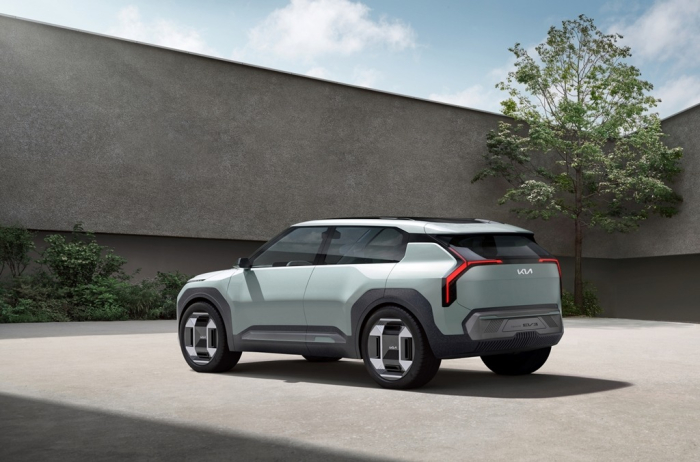
The company is poised to manufacture entry-level EVs at its Indian plant for the local market, which has been producing only internal combustion engine cars so far.
Write to Sungsu Bae and Nan-Sae Bin at baebae@hankyung.com
Jongwoo Cheon edited this article.
-
 AutomobilesHyundai Motor, Kia to adopt Tesla’s charging standard for EVs
AutomobilesHyundai Motor, Kia to adopt Tesla’s charging standard for EVsOct 06, 2023 (Gmt+09:00)
1 Min read -
 Electric vehiclesHigh price, quality issues slow Kia EV9 sales in Korea
Electric vehiclesHigh price, quality issues slow Kia EV9 sales in KoreaSep 07, 2023 (Gmt+09:00)
3 Min read -
 Electric vehiclesKia unveils design of EV5, its first China-made global electric car
Electric vehiclesKia unveils design of EV5, its first China-made global electric carAug 25, 2023 (Gmt+09:00)
3 Min read -
 Electric vehiclesCarmakers in race for low-cost EVs amid tepid sales growth
Electric vehiclesCarmakers in race for low-cost EVs amid tepid sales growthAug 08, 2023 (Gmt+09:00)
2 Min read -

-
 Electric vehiclesKia unveils flagship EV9 design; world premiere in March
Electric vehiclesKia unveils flagship EV9 design; world premiere in MarchMar 15, 2023 (Gmt+09:00)
1 Min read -
 Electric vehiclesKia debuts all-electric EV6; runs faster, longer than Tesla, IONIQ 5
Electric vehiclesKia debuts all-electric EV6; runs faster, longer than Tesla, IONIQ 5Mar 30, 2021 (Gmt+09:00)
2 Min read


